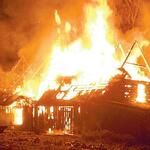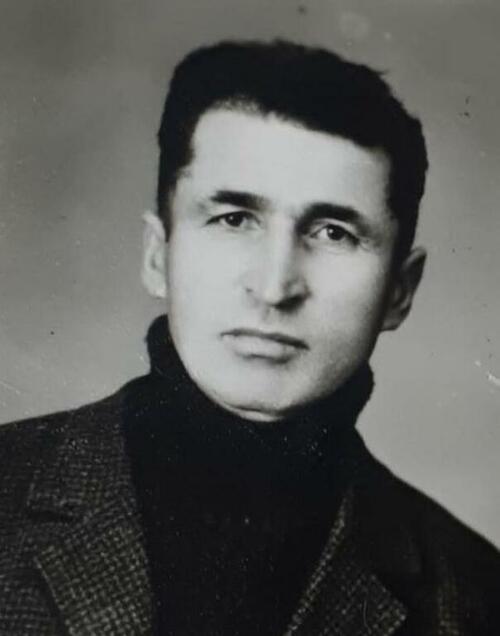It is believed that history repeats itself in the form of farce. Unfortunately, Ossetian history is repeated over and over again in the form of tragedy. Almost every generation has been scorched by war for centuries. Such a neighborhood defined the fate - as a test. And no matter what the punishers are called - princes, Mensheviks, communists or democrats - the bestial grin of Georgia remains unchanged. It would seem that what could be worse than the death of a mother in front of a small child? The painful death of her son. Both tragedies are in the fate of one woman ...
Vasily Dzhabiev and Ekaterina Tasoeva got married back in 1910. They lived in the village of Rustau, Znaur district, were raising a son and daughter. They were not live rich, but had their own household, and the hardworking spouses did not need anything.
In 1920, began the aggression of the Menshevik Georgia, the villages of South Ossetia burst into flames. The enemy did not spare the elderly, women or children. The villagers were receiving the information about the atrocities of the Georgian regime. People left their homes and fled north. Not everyone could withstand the difficult road along the mountain route. Along the way, children were dying, exhausted old men and women were forced to stay on mountain trails, and lived out their last days in agony. The eyewitnesses kept in their memory until the end of their lives, the horrible events of those days, told about them to children and grandchildren. The daughter of Vasily and Catherine - Anna Dzhabieva does not hold back tears every time, telling about the tragedy of her family and the entire South Ossetia.
“Georgian fascists reached our village. They were killing, sparing no one, raping women, ”the woman says with mournful calm. She rarely talks about her crippled childhood - her memories are too heavy.
“They are coming, they are coming,” cried one of the residents of the village of Rustau, and the villagers rushed to run in different directions, trying to have time to take cover. My mother grabbed us with my brother and rushed towards the forest. Many people followed us, mainly children and women. By then, the men had joined the partisans to fight the enemy,” she said.
So began a long journey to nowhere. On the way, their mother Catherine died. Children aged five and four years left orphans. They were sheltered by the aunt on the part of the father and raised as relatives. Father did not appear for a long time while the war was on, he was listed perished.
But one day after the establishment of Soviet power, a man appeared on the threshold of their aunt’s house with a long beard and without one arm. Anna and her brother Ivan were playing in the courtyard of the house. Seeing a stranger, they froze - father and children were silently looking at each other, and then silent aunt was interrupted by the aunt's cry: "Vasily ...".
“We did not recognize the father, but our aunt recognized him immediately, and rushed to meet him. And we, cautiously, followed her. Father hugged us and did not let go for a long time. We were happy - we have a dad, and we are no longer orphans, ”Anna Dzhabieva recalled.
Fate took away her brother too ...
The villagers told stories about the atrocities of Georgians in Rustau for a long time, each crying recalling his tragedy - crippled fates, murders, tortures. Anna Dzhabieva has recalled that her cousin Olga, who was older, was hidden among a pile of duvets so that the Georgians could not find her.
“In their house, they broke everything. Not a single family found their home in its original condition after returning to their homeland. And many saw ash on the place of the house,” said Anna.
The woman's story was interrupted by stifled sobs.
As the saying goes, trouble does not come alone. The Great Patriotic War began, many people left the village of Rustau to the front, among them Anna's brother Ivan Dzhabiev. In the early years, they received news from him, but letters stopped coming. Some villagers returned, but Ivan remained only in the memory of loved ones. To this day, he is listed the missing ...
Continuation of the genocide - the death of her son
Georgian fascists repeated genocide in the late 1980s and early 1990s. And Anna Dzhabieva again could not escape the hell of war.
By that time, Anna married Mikhail Doguzov in the village of Satikar, the family was bringing up eight children - four girls and four boys. The husband died early, older children managed to get their own families. In 1989, when the Georgian provocations began, military battalions were immediately formed in the villages of the Rpublic. Anna's youngest son, Ivan, whom she named in honor of her brother, was defending the Fatherland together with others.
After those events the head of the Foundation for the Wounded, who became disabled during the fighting in the territory of South Ossetia from 1989 to 2008, Madina Plieva, will tell about Ivan: “Even then, he clearly showed his patriotic feelings - protecting the homeland and responsibility to the people of South Ossetia were above all for him . Other guys were listening to his opinion. The Georgians had such activists on a separate list, and active work was conducted to detain and destroy them.
Probably it was patriotism and love for the motherland that brought us very close to Ivan, we became close friends, and during the years of military aggression - military comrades. The roads to these villages were blocked, communication with Tskhinval was interrupted, and then very young guys had to go around on foot, through Uanat - Zalda - Gufta - Zar to get to Tskhinval, and back along the same route to Satikar with a load of medicines, ammunition, essential goods. ”
March 18, 1991. Cold morning, and here is good luck - the Ural truck is going in the direction of Satikar, accompanied by the military. Ivan took advantage of this, but the return trip turned out to be for him and another 17 fellow travelers of dear death. Ivan Doguzov became one of the 18 victims of the Ered tragedy, which became one of the most terrible and inhuman events in the recent history of South Ossetia. The victims were found after two and a half years. And by that time, Anna, having learned that her son had fallen into the hands of merciless beasts in human guise, suffered a severe stroke, from which she had not fully recovered. Then there were long years of rehabilitation of health. So, the black Moloch of fascism walked on the fate of Catherine. And there was a memory of the Ivans, who gave their lives in the fight against the brown plague ...





